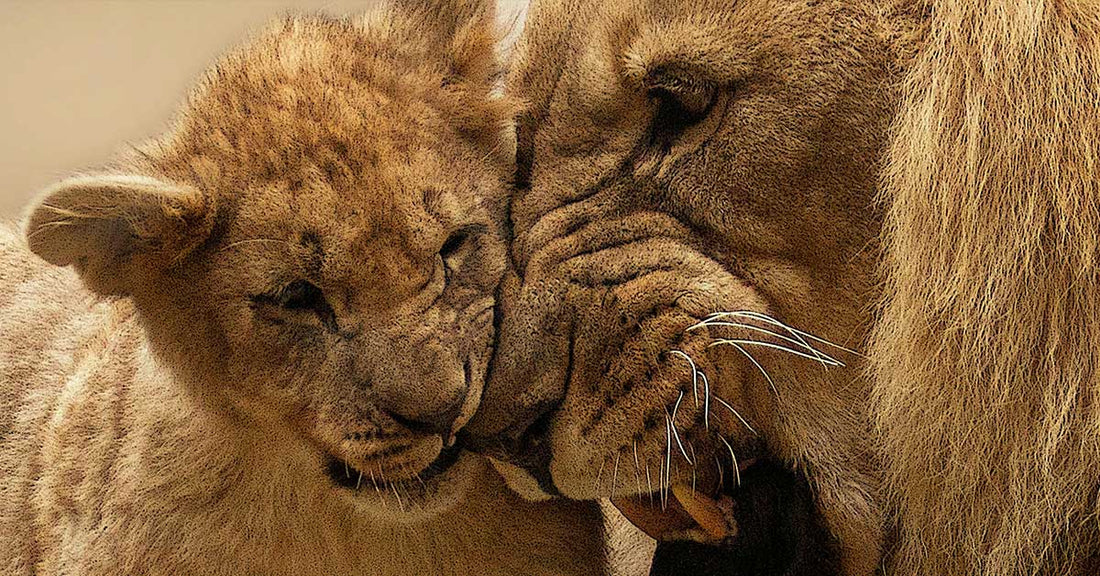When A Mother Lion Risks It All to Confront Powerful Male Threat
Matthew Russell
A lioness doesn’t ask for peace—she enforces it.
In the wilds of Africa, motherhood is a full-contact role, where instincts sharpen like claws and split-second decisions determine survival. In the Serengeti’s Maasai Kopjes, a viral video captured a lioness and her sister charging at a male lion stalking their cubs. They did not hesitate. They did not bluff. They ran straight at the threat, forcing the larger male to back down.
Photographer Venkat Krishnan, who filmed the scene, called it “one of the most epic arguments we have seen in the wild” in a post shared by The Indian Express.
These displays of maternal courage are no anomaly—they're a vital part of a lioness's life.

A lioness will confront a much larger male to defend her cubs.
Birth in Seclusion, Defense by Nature
When it’s time to give birth, a lioness separates from her pride, choosing dense cover for safety. Her newborns are blind, vulnerable, and silent. For weeks, she nurses them alone, moving them every few days to avoid detection by predators or rival lions. As Africa Wildlife Detective explains, cubs stay hidden until they are at least one to two months old.
Lionesses don’t raise cubs casually. They remain alert to threats from the outside—and within. A new male lion joining the pride often spells danger. He may attempt to kill cubs that aren’t his to bring their mothers back into heat. This brutal reality is met with roaring resistance.
“Lionesses are incredibly nurturing and extremely protective,” reports A-Z Animals. “They will fearlessly protect and defend their cubs against any threat, including other lions.”

Cubs are born blind and helpless, depending solely on their mothers.
When Fathers Go Too Far
Not all danger comes from outsiders. Even a cub’s father may draw a warning if he oversteps. A now-famous incident captured by photographer Elliott Neep shows a lioness swatting the cub’s father after he growled too harshly at their son. The lion, easily 500 pounds, recoiled as the mother stood her ground.
“It was extremely brave of her to stand up to him.” Her slap—claws out—left a visible mark,” Neep told Daily Mail. “The lion slapped back, claws in.
That moment reflected an unshakable rule: cubs fall under the lioness’s jurisdiction, and she enforces it with unrelenting authority.

A lioness may risk death rather than surrender a cub.
Life in the Pride
Lions are the only big cats that live in prides, complex family groups often numbering 20 or more. These are matriarchal networks at heart. While males protect territory, the lionesses hunt and care for the young. Multiple females may give birth within weeks of one another, then nurse each other's cubs without hesitation. This communal care strengthens the pride—and the gene pool. As Africa Wildlife Detective reports, such cooperation boosts survival chances for every cub.
Still, lionesses are most protective during the early months. Before cubs are introduced to the pride, their mother is their sole line of defense.
The Lessons of Play and the Path to Independence
Around three months of age, cubs begin eating meat. Play becomes a serious affair—teaching them how to stalk, tackle, and interact. By the time they're 10 months old, they are weaned. Yet they remain dependent for food and protection. As Animals Mom reports, females continue nurturing their cubs until they are strong enough to hunt and fend for themselves—often up to two years.
Male cubs eventually leave or are forced out. Female cubs may remain and contribute to the pride’s next generation. The mothers, however, are never off duty. If the pride is threatened, if a cub cries out, or if danger approaches, a lioness reacts with precision.

Lionesses fight off threats from both outside and within the pride.
Not All Encounters End Well
The maternal instinct in lions is deeply ingrained. But not every lion cub is born into safety. Some are taken from their mothers early and used in tourist photo ops—destined later for canned hunting. As Africa Wildlife Detective warns, many cubs paraded for selfies were never orphaned. They were taken from mothers, raised to trust humans, and sold for slaughter.
That makes the lioness’s instinct to protect all the more sacred. In a landscape filled with peril, she fights for her cubs with everything she has. The wild demands nothing less.

